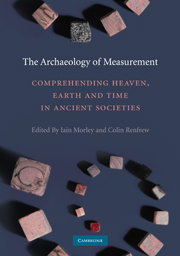Book contents
- Frontmatter
- Contents
- List of figures and tables
- List of contributors
- Acknowledgements
- The Archaeology of Measurement
- Introduction: Measure: Towards the construction of our world
- SECTION I NUMBER: COUNTING, MATHEMATICS AND MEASURE
- SECTION II MATERIALISING THE ECONOMY
- SECTION III DIMENSIONS AND BELIEF
- SECTION IV CALENDAR AND COSMOLOGY
- SECTION V THE SPIRITUALITY OF MEASURE
- Index
SECTION I - NUMBER: COUNTING, MATHEMATICS AND MEASURE
Published online by Cambridge University Press: 05 June 2012
- Frontmatter
- Contents
- List of figures and tables
- List of contributors
- Acknowledgements
- The Archaeology of Measurement
- Introduction: Measure: Towards the construction of our world
- SECTION I NUMBER: COUNTING, MATHEMATICS AND MEASURE
- SECTION II MATERIALISING THE ECONOMY
- SECTION III DIMENSIONS AND BELIEF
- SECTION IV CALENDAR AND COSMOLOGY
- SECTION V THE SPIRITUALITY OF MEASURE
- Index
Summary
The volume opens with a section that deals with the conceptualisation of number and measurement, how systems of thought and recording impacted upon the capabilities for measurement activities and numerosity in different parts of the world.
Direct archaeological evidence for measurement activities is the focus of the vast majority of the contributions to this book; however, it begins with a consideration of the extent to which measurement capabilities of various kinds are inherent requirements for other activities for which we have archaeological evidence – activities that do not themselves provide direct evidence of measurement. Amongst prehistoric hunter-gatherer populations there is no unambiguous direct evidence of numeracy of the kinds discussed in the other contributions to this volume, but many of the activities they carried out would have required various kinds of relative and absolute reckoning, including time, distance and division. This first chapter seeks to deconstruct measuring activities into key types, to identify the significant differences and interdependencies between them. It does so in the context of some of the types of reckoning and measurement that would have been required for activities that we know were essential parts of hunter-gatherer life and discusses how these should be conceived. The principal focus of the latter part of this first chapter is the identification of time, cycles and causal relationships, and how these impact on ritual practice and belief systems.
Information
- Type
- Chapter
- Information
- The Archaeology of MeasurementComprehending Heaven, Earth and Time in Ancient Societies, pp. 5 - 6Publisher: Cambridge University PressPrint publication year: 2010
